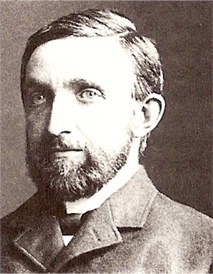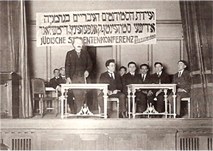Judaism
Texts by Dr. Antonio Moreno González
In his youth, Einstein did not feel a sense of belonging to the Jewish community, possibly because his family, with the exception of one of his uncles, were not practicing Jews. Having been educated at a Catholic school, his religious interest was channelled elsewhere. It was only after establishing himself as a lecturer in Prague, at the age of 32, that he saw at first hand the conditions under which many Jews were forced to live on the fringes of society. From then on, he increasingly accepted that he was a Jew and that he wanted to be one, identifying with the Zionist movement which was demanding an Israeli homeland in Palestine. Much of Einstein's fame from the 1920s on, generated of course by his scientific contributions, was due to his work in various countries in support of the Zionist cause, and more specifically his participation at public events, sometimes before large crowds, to raise funds among the Jewish communities of the world to help build a Hebrew University in Jerusalem. There were times when Einstein doubted whether the Zionist movement would live up to his expectations of peaceful integration with the Arab people - and indeed, we are reminded of this failure in the news every day- and he even doubted whether the effort he had put into the creation of the university was really worthwhile: he feared that it might become not more than a Jewish theological seminary.
He devoted much of his time not only to making public declarations, but also to publishing articles and manifestos in an attempt to arouse a sense of identification among the Jewish people, who in many cases for fear of disdain, alienation and persecution sought to conceal their true identity. He Looked for the signs of Jewish identity which he saw in "the democratic ideal of social justice, coupled with the ideal of mutual aid and tolerance among all men" and "the high regard in which it holds every form of intellectual aspiration and spiritual effort". It was these aspects--which Einstein considered to be essential to the Jewish tradition--that allowed him "to regard my belonging to it as a gift of great fortune", he wrote in an article entitled "Why Do They Hate The Jews?" ( Collier's Magazine , New York, 1938).
Basing himself on studies by renowned anthropologists, Einstein maintained that the Jewish people was not a race per se, however much it was considered as such by the political propaganda which had resulted in its persecution and diaspora. It was the Jewish people's signs of identity, Einstein felt, and the fact that in small groups they were, ultimately, the settlers of the entire world, and could be considered as a threat if they joined forces in a combined and widespread action, that was "the essential cause for the savage hatred of Jews raging in present-day Germany".
Anti-Semitism was so obtuse, so blinding and so radical that Philipp Lenard, winner of the 1905 Nobel prize for physics for his work on cathode rays, who had taken an interest in the photoelectric effect before Einstein discovered the quantum law that governed it, and had even lectured Mileva, and who for all of these reasons was held in high regard by Einstein, attacked relativity and Einstein to whom he referred as a "pure-blooded Jew" and railed against "Jewish science", ignoring his own debt to Hertz, another Jew, to whom Lenard owed much of his scientific success.
Such was Lenard's intolerance and aggression that he once said "it is evident that the Jew lacks an understanding for truth, unlike the Aryan research scientist in his serious, painstaking search for the truth... Science, like any other human product, is racial and is conditioned by blood".

Philipp Lenard (1862 - 1947)

Talk at the Congress of Jewish Students, 1924
